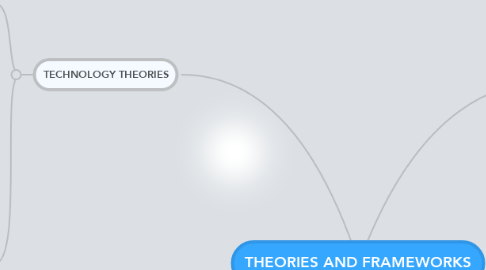
1. TECHNOLOGY THEORIES
1.1. SCOT (Social Construction of Technology (n.d.). Retrieved from http://en.wikipedia.org/wiki/Social_construction_of_technology
1.1.1. Argue that technology does not shape human action, rather human action shapes technology
1.1.2. Determines why a technology was successful or not
1.1.3. An understanding of how technology is embedded in social context is critical
1.1.4. Core Concepts
1.1.4.1. Interruptive flexibility- Each technological artifact has a different interpretation amongst differing groups of people
1.1.4.2. Relevant Social Groups- the relavent groups determine the success as they are the producers and users
1.1.4.3. Design Flexibility- allows for the design to change and adapt to the various groups
1.2. Media Ecology. Postman, N. (n.d.). Retrieved from http://www.media-ecology.org/media_ecology/index.html
1.2.1. No one true definition
1.2.2. the study of media environments, the idea that technology and techniques, modes of information and codes of communication play a leading role in human affairs.
1.2.3. Technology effects how we see and interact with the world
1.2.4. Is often seen as the counter argument to SCOT
2. Philosophy of Teachnology. (n.d.). Retrieved from http://www.cidde.pitt.edu/ta-handbook/teaching-technology-1
2.1. Similar to a philosophy of teaching, which guides how teachers pass on knowledge to the learner
2.2. Emphasizes how teachers integrate and use technology effectively in the classroom for learning purposes
2.3. Is not confined to classroom use, but involves all areas of professional development
3. LEARNING THEORIES
3.1. Connectivism Siemens, G. (n.d.). Retrieved from http://www.connectivism.ca/about.html
3.1.1. Belief that learning connects specialized nodes or information sources
3.1.2. Connects emotions and cognition in order to make learning meaningful
3.1.3. Different approaches and personal skills are needed to learn effectively in today's society
3.1.4. Learning happens in many different ways
3.1.5. knowing where to find information is more important than the information known
3.1.6. Learning can reside in non-human appliances such as the community, network, or database
3.2. Constructivism (n.d.). Retrieved from http://www.slideshare.net/olupo/constructivism-basics-presentation
3.2.1. Built on the idea that learning and new knowledge is built on preexisting knowledge. i.e constucted
3.2.2. People work together to develop a stronger framework for learning
3.2.2.1. generates new and deeper understandings
3.2.3. Learning is ACTIVE
3.2.4. Emphasizes an authentic learning experience
3.2.5. Prior experiences strongly influence how knowledge is constructed
3.2.6. Learners are responsible for their own learning, which further develops metacognition
3.3. Cognitive Load. S, M. (n.d.). Retrieved from http://im404504.wikidot.com/cognitive-learning-theory
3.3.1. Based on how our brain processes information and how information is stored
3.3.2. Two kinds of memory: Working memory and long-term memory
3.3.3. Long-term memory is where we store our memory for later recall
3.3.4. Working memory is the information and knowledge we immediately take in, then moves to long-term memory
3.3.5. Overload can occur if working memory has too much to process- can hinder building knowledge
3.3.6. Teachers must be cognizant of how much new information they are presenting to the learner
4. TPACK. Koehler, M. (n.d.). Retrieved from http://www.tpack.org/
4.1. Assumes teachers need 3 types of knowlwdge
4.1.1. Content
4.1.2. Pedagogical
4.1.3. Technological
